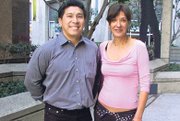Apparel Companies Fishing for Financing Get Few Nibbles
Gaining access to capital has been a perpetual challenge for start-ups and young apparel companies, but some investors are beginning to warm up to the industry as the West Coast fashion scene remains hot.
Equity investors are taking a second look at the local apparel industry and some have been taking chances on smallto mid-size companies that show growth potential. The pickings of financing are slim, however, as many investors still shy away from apparel, given the general fickleness of fashion. Many companies are just too small for the venture capi-tal market, but some new resources are giving more companies some hope.
In Los Angeles, a relatively new investment company, American Business Fund, has helped several companies develop their lines. More recently, ABF has aligned with Fab-One Inc., a growing women’s contemporary line now in its fourth season. ABF offers general factoring services. But in Fab-One’s case, it made an equity investment and became a shareholder in the company, while assuming all marketing, finance and back-office responsibilities.
The partnership allows Fab-One’s designer, Farida Benderradji, to focus more on the creative aspects of business as well as sales and quality control.
“When you’re on your own, you have to do everything,” Benderradji said. “You look for fabrics. You have to find pattern makers, do costing, line sheets and design. It’s too much for one person. But now with a partner, you can draw a path to make it all successful. Everyone wins.”
ABF’s managing director, Boz Lee, admitted that investing in apparel companies is risky but added that it could be rewarding.
“Farida has experience in Europe,” Lee said. “She’s not in a volatile segment like juniors and we think she’s in a good niche. So the growth potential outweighs the risk.”
Fab-One appears to be on the road to success. The line of form-fitting tops, dresses and pants in soft fabrics has been picked up by the S.F.L.A. showroom in The New Mart in downtown Los Angeles. The designer and her company are embarking on a marketing project with ABF, which may include advertising and direct mail.
Other companies have also benefited from equity financing. Yoga-inspired line Lululemon Athletica, which recently opened company-owned stores in Newport Beach, Calif., Santa Monica, Calif., and San Francisco, has partnered with Boston-based equity investor Advent International. The alignment will help the Vancouver, B.C.–based company support a growth campaign in the United States and provide partial liquidity to Lululemon founder Chip Wilson, who maintains a majority position in the company while the chief executive post has been turned over to Robert Meers, a former Reebok International executive who is now an operating partner at Advent.
“Advent proactively pursued an investment in Lululemon because of its leading product offerings, inspiring culture and impressive growth characteristics,” said David Mussafer, managing director at Advent.
Lululemon has experienced double-digit growth and plans to open 15 new stores a year in the United States over the next five years.
Most apparel start-ups usually use their own money or borrow from friends and family, noted Frances Harder, executive director of the Los Angeles–based business incubator called Fashion Business Inc.
“If they don’t have the money after they get the orders (to finance production), they could run into problems,” Harder said. Factors can help to a certain degree. There’s also a new wave of purchase order factoring, in which companies turn over their purchase orders to a factor instead of their accounts receivables.
In many cases, finding a good accountant can get companies to the next level.
“We are like their outside CFOs,” said Felix Wasser of Sherman Oaks, Calif.–based Felix R. Wasser & Associates, which caters to apparel companies. Wasser provides services such as financial projections and cash budgeting and also helps to identify factors in addition to general accounting services like filing tax returns.
A 30-year industry veteran, Wasser has recently seen an influx of young entrepreneur types entering the fashion business. “There’s a lot of new blood and they’re very good at what they do,” he noted. “Some are challenged to raise money, but it’s not forever.”
The equity market is limited, but companies such as ABF have already been able to leverage synergies between clients.
ABF customer Cherish International, a Los Angeles manufacturer, has been helping to produce some of Fab-One’s products, which benefits all parties involved.
“It’s worked out well so far,” said Manny Kim, a partner in Cherish, which markets its own label, makes private label goods and provides incubator services for small companies.
Aside from equity financing and factoring, ABF also provides trade credit guarantees, purchase-order financing, start-up capital, and construction and mortgage loans.
Harder said FBI members have also been obtaining financing through the federal Small Business Administration and through commercial banks like Bank of America, which has a program for small businesses. “Those usually require having collateral,” Harder noted.
The SBA has provided stepping stones for several successful apparel companies including activewear brand Under Armour, a Baltimore company that recently issued a public offering.
Also, the SBA has launched an online information service for entrepreneurial women called “My Biz for Women” at www.sba.gov/women. The site provides information on how to gain access to capital as well as research information and government data.






















